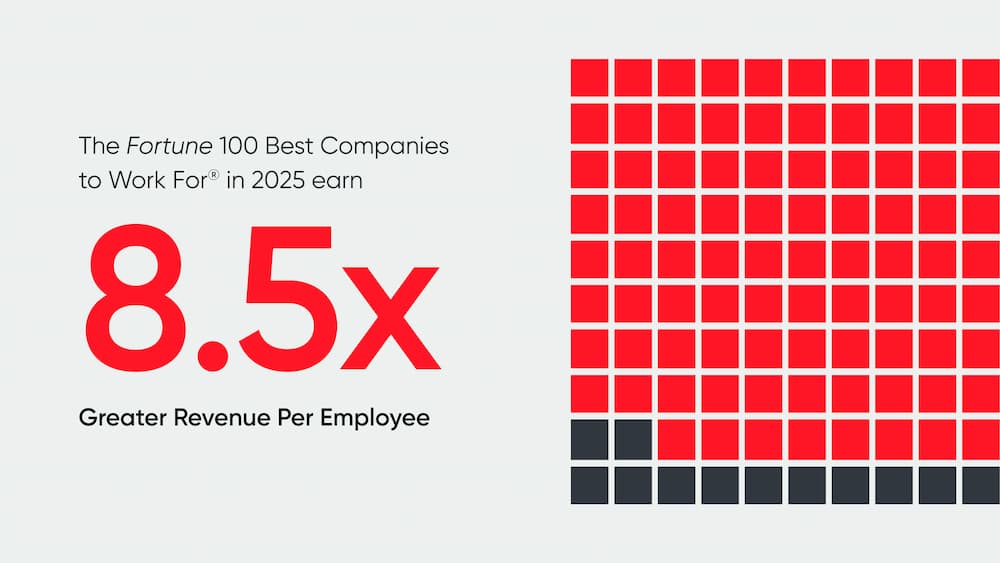
HR executives from Stryker, AbbVie, Cisco, and Teleperformance joined a Fortune roundtable to discuss strategies that build high-performance workplace cultures.
For companies on the Fortune 100 Best Companies to Work For™ Europe, culture is a key performance indicator for the business.
“It’s really simple,” says Sam Oliver, vice president, people and communities for EMEA at Cisco. “How we feel drives how we think; how we think drives how we behave; and how we behave drives how we perform. So, if we want to drive great business performance, we’ve got to come back to [the question]: How are people doing?”
Cisco, No. 5 on the 100 Best list in Europe, is one of four global companies that shared their experience as part of a Fortune roundtable. Leaders from Cisco, Stryker (No. 6), AbbVie (No. 2), and Teleperformance (No. 12) joined Great Place To Work® for a virtual conversation led by Orianna Rosa Royle, associate editor at Fortune.
The topic: What experiences create workplace cultures that drive business performance?
Learn strategies from other great workplaces at the For All Summit™ April 8-10 in Las Vegas!
Do employees have different needs around the world?
For leaders with big global workforces, the main drivers of great employee experience don’t change.
“When you join a company, you expect to have one culture that will be the same across the globe,” says Thomas Petit, vice president, business HR international therapeutics at AbbVie.
When you focus on human needs, you find overwhelming similarities around the world, says Alan Winters, chief people officer and deputy chief compliance officer at Teleperformance Group.
“We all react the same way,” he says. “We all want the same thing … we may express it slightly differently.”
Those needs boil down to three key elements: a leader who respects them, a sense of teamwork across the organization, and meaningful work that makes an impact.
“Those three elements have always been the key ingredients to a great place to work,” says Tony Bond, chief impact officer at Great Place To Work. What has changed is what people expect from their leaders.
“What defines a leader in today’s world is somewhat different than what defined a leader 10 years ago,” Bond says. Where leaders were once aloof role models who had all the answers, now employees are looking for coaching and support.
“Leadership has changed,” agrees Sabine Krummel-Mihajlovic, vice president of HR for Europe at Stryker. “Empathy is more the focus these days … also creating psychological safety.”
How global workplaces focus on psychological safety
All four companies agree that psychological safety is a crucial aspect of great workplace culture looking to an increasingly volatile future.
“In an environment where we know that the pace of change and the level of ambiguity in work and the world is only going to increase, how do we evolve our workplace?” Oliver asks.
At Cisco, it means ensuring every employee follows a simple routine that builds a relationship with their direct manager.
“Every single week, every leader will sit down with every person virtually or in person and say, ‘What was good about last week? What did you love? What did you not love?’” Oliver says. Those conversations seem simple, but over time are crucial building blocks for trust.
While annual employee engagement surveys can provide important data, great workplaces do much more to ensure every voice is heard.
“We ask questions every day, week, and month,” says Winters about Teleperformance and its employee listening programs. Only when employees feel psychologically safe will you get open and genuine information about their experience at work.
How do you build psychological safety? “Over time,” says Krummel-Mihajlovic, “by actively listening and being accountable.”
Are global employers committed to DEIB?
While only half of employees at typical workplaces in Europe say their company’s decisions benefit the environment or society, it’s a different story at companies on the 100 Best list in Europe, where DEIB is an integral part of the talent strategy.
“There [will be] a war for talent in the future,” says Krummel-Mihajlovic. “If we don’t provide those opportunities for belonging … I think we will fail.”
Winters points to questions he gets from frontline staff and managers about DEI strategy, employee resource groups, or community engagement as evidence that these programs matter deeply to employees.
“For most people in the job market today, it is important,” he says. “If you pull away from that, you’re going to end up not getting the best talent for the roles that you have open.”
How global leaders are adapting to AI
When thinking about the future, all the companies on the panel are focused on AI.
Only one in four employees at a typical workplace in Europe say their company is making meaningful investments in their ability to use AI. That’s a big missed opportunity, according to these leaders.
“What we’ve found is that as people start to play with AI and get comfortable with it, some of that fear around ‘What is this going to do for me?’ goes away,” Oliver says. To that end, Cisco’s entire HR team is undergoing AI training and learning to understand how the technology might improve their work — not replace it.
Winters offers a word of caution, however.
“My fear is that companies will be implementing AI for the sake of implementing AI,” he says. “There’s technology out there now that could automate the performance management review process ... Is that really the human experience you want when you’re delivering coaching and performance management and goal setting?”
“The best companies are first looking how do we augment the role and the jobs that people have with the technology as opposed to replacing people,” Bond says. By focusing on creating opportunities for people, companies and employees win, with workers developing new AI skills that create more value for the business.
Learn more at the For All Summit in Las Vegas!
Join us for a blockbuster week of sessions, keynotes, and networking on April 8-10 to hear more from leaders at award-winning workplaces.






